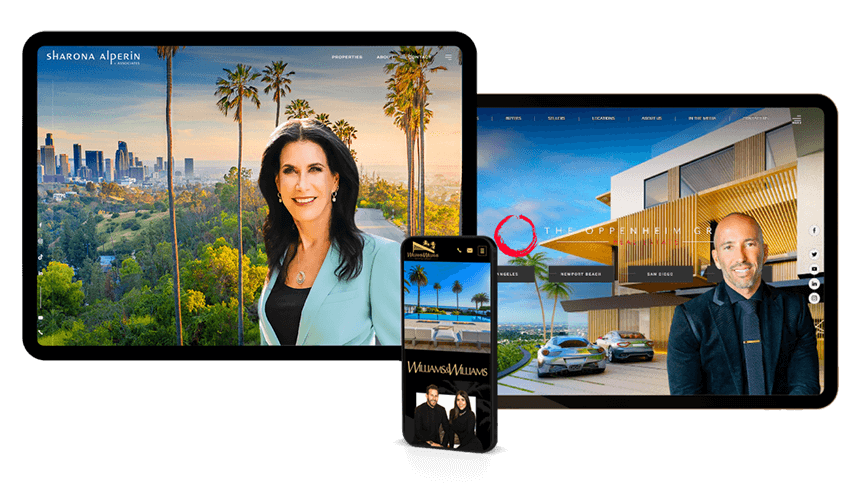Setting up your Real Estate Marketing Strategies for 2025
The real estate landscape has changed significantly over the last few years, and so have the ways buyers and sellers engage with agents online. Having a thoughtful, data-driven marketing strategy is more important than ever. Here’s how to set yourself up for success in 2025 and beyond.
Table of Contents
Use paid ads
Lead generation via paid ads makes use of keyword research to determine what your target audience is looking for online. When a prospect clicks on your PPC ad, the ad will take them to your landing page, and you get charged a fee for that click.
Paid ads have tremendous potential for real estate lead generation, but you need to use your advertising budget wisely. To make the most out of PPC ad spend, you can work with a real estate marketing company to identify your ideal customers and the keywords. They can also help you study your competitors and optimize ad copy.
Get the immediate visibility you deserve.
Our team of experts can craft a PPC strategy that gets you instant leads.
But most importantly, paid search campaigns are measurable, helping you determine whether or not you’re meeting your goals. Check out this video on the importance of setting numerically measurable goals for real estate agents:
Use retargeting
A retargeting campaign keeps your name or real estate brand top-of-mind for prospects after they’ve visited your site or interacted with your brand on other online channels. Retargeted ads will appear at various sites and platforms they visit to give them the extra nudge they need to make a decision.
According to the National Association of Realtors (NAR)’s Generational Trends Report, buyers typically search for homes for ten weeks, looking at a median of seven properties and viewing two of those homes online.
Moreover, buyers and sellers may check out multiple real estate sites before deciding which agent they feel most comfortable working with.
That’s where retargeting comes into play. Custom retargeted ads will serve as a reminder of any listings or real estate services that a prospect has viewed on your site, persuading them to choose you after they’re done comparing listings and agents online.
Ramp up video marketing
If a picture paints a thousand words, then a video paints a million. Real estate listings with videos get 403% more inquiries compared to listings without video, according to Quick Sprout.
Real estate agents can use high quality videos to showcase properties for sale and pique buyers’ interest. Aside from including videos in your listings, you can also upload videos on YouTube to encourage your target audience to follow you online, sign up for a newsletter, or get in touch with you for a home viewing appointment. Despite their increasing reliance on video, the majority still want to tour the property personally before making an offer.

See What Powerful Video Can Do
Explore real estate sites that use video to impress.
Introduce virtual or augmented reality tours
Speaking of growing trends, 3D virtual tours and augmented reality are great ways to keep your marketing strategies fresh and up-to-date.
3D virtual tours allow visitors to immerse themselves in a property by navigating it online, room by room. This helps buyers get a better sense of the layout and flow without needing to visit in person. It’s especially helpful for out-of-town buyers or those comparing multiple listings in a short period of time.
Meanwhile, augmented reality lets buyers use their phones or tablets to visualize furniture placement or design changes within a physical space. This added layer of interaction can help them picture the home as their own—making it easier to take the next step.
Stay on track with social media marketing
With over 3 billion monthly active users, Facebook and other social media platforms present countless opportunities to reach homebuyers and sellers. If you’re looking for ways to strengthen your real estate marketing strategies for this year, look no further than social media.

-
Be smart about short-form video content. Short-form video remains one of the most effective ways to engage with your audience, but success in 2025 means going beyond basic property clips. Use this format to build trust and personality into your brand. Create quick behind-the-scenes videos, answer FAQs in your niche, or highlight real client wins. Make sure you tailor each video to fit the platform, too: vertical, fast-paced content for TikTok and Reels, polished and professional for YouTube Shorts.
-
Use Facebook and Instagram Live videos to provide interactive property tours, offer buying and selling tips, and engage your online followers. Appearing in live videos helps prospects connect your real estate brand with a name and face that feels familiar, allowing you to differentiate yourself from other agents and establish a human connection with potential clients.
Just remember to stay true to your brand identity – social media users value authenticity more than anything. Stay consistent with your brand as your online following grows.
-
Organize your posting schedule around a carefully thought out social media marketing campaign. Aside from producing relevant ads with persuasive copy and a clear (CTA), you need to schedule your online posts and uploads based on data about your followers’ social media behaviors (e.g. time of day they’re most active on Facebook, etc.)
-
Join private Facebook groups or start your own. Because of their popularity, Facebook groups offer another way of engaging with your target audience. Moreover, most private groups are location-based, helping you reach out to prospects within a specific service area.
When starting your own real estate Facebook group, you can invite past, current, and potential clients to join. Initiate meaningful conversations around real estate to keep group members engaged and increase your brand’s value.
Smarter Strategies. Better Results.
From SEO to PPC, we focus on what drives results for your business.
Add new features to your website
If you don’t already have a dedicated site, it’s never too late to have one built and designed. The NAR’s latest research says doing an online search for properties is the first step for homebuyers of all generations, with 43% using the internet to find listings.
If you already have a site, you can give your marketing strategy a boost by adding new features and enhancing existing ones:
-
Use high quality photos and detailed property descriptions – 83% of all buyers said that photos were the most important site feature was photos while detailed information about homes for sale was also another important feature to buyers from all age groups.
-
Leverage artificial intelligence (AI), whether it’s for automated chatbots on your website or content creation tools that help you write listing descriptions, email campaigns, or social media posts faster. AI can also support lead scoring, client follow-ups, and personalized recommendations based on user behavior.
-
Offer a home valuation calculator – Homeowners who want to sell but aren’t sure how much to sell for will appreciate a home valuation feature to help them get an idea of what their asking price should be. You can request their contact details in exchange for the information, allowing you to capture leads.
-
Integrate landing pages with lead generation – Landing pages serve a specific and important purpose for your site, which is to capture leads, streamline traffic, increase conversions, and reduce the number of clicks site visitors need to make to find the information they need.
These pages contain little but persuasive content and a strong call to action (CTA) that compels site visitors to either sign for a newsletter or make an account. It’s possible to have multiple landing pages with unique content and different marketing goals.
You can integrate landing pages into real estate lead generation by linking to them in your Facebook ads or guests posts, for example. You can also direct your PPC prospects to landing pages.
Frequently Asked Questions
Agents seeing the strongest results are using a mix of targeted paid ads, SEO-optimized websites, video-first content on social media, and retargeting to stay top-of-mind. You don’t have to do everything at once, but make sure what you are doing is done with intention and a goal in mind.
It’s a good idea to reassess your strategy at least once a year, but monitor performance quarterly. Markets shift, platforms evolve, and client behaviors change—what worked a year ago might not be as effective today. Small adjustments, like refreshing your ad creative or testing new video formats, can keep your marketing efforts sharp without a full overhaul.
Content that feels informative, quick, and authentic tends to perform best on social media. Think short-form videos that answer common questions, give quick property tours, or highlight local insights.
Yes—your website is still essential. Social media is great for visibility and engagement, but your website gives you control over your brand, lead capture, searchability, and building credibility.
Build a marketing strategy that keeps up with today’s market
If you’re ready to step up your real estate marketing strategies in 2025, Agent Image is here to help. We’re passionate about helping real estate agents build and maximize their online presence. Contact us to get started.




